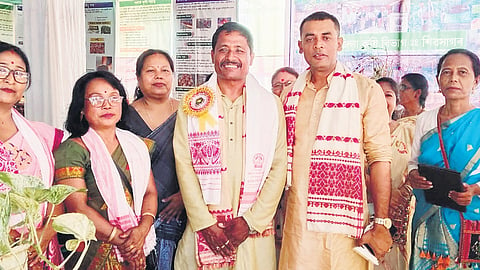

ASSAM: Jitu Dutta’s journey from a struggling boatman to a successful businessman and philanthropist is a testament to the power of perseverance and dedication. What began as a humble effort to support his family has transformed into a remarkable story of success and giving back to society.
At 48, Jitu Dutta is no longer the exhausted boatman he once was. His hard work has paid off, not only financially but also in his commitment to philanthropy. Today, he supports underprivileged students, offering them financial assistance to pursue their education.
Born in Dikhowmukh Dewgharia village, located on the verdant riverside of Dikhow in Assam’s oil- and tea-rich Sivasagar district, Jitu grew up in a joint family. His father, a poor, illiterate farmer, worked tirelessly to make ends meet.
Despite his lack of education, Jitu’s father deeply valued the importance of learning. Despite the family’s financial difficulties, he ensured that his children received proper education. After Jitu graduated from an Industrial Training Institute, the family’s financial situation worsened, prompting him to seek work.
Jobs were scarce, but Jitu’s resourceful mind soon found an opportunity. He had seen pilgrims travelling to the Ramkha Peeth Devalaya and the Ajan Peer Dargah Sharif, situated near the confluence of the Dikhow and Brahmaputra rivers. Realising the potential to earn by ferrying pilgrims across the river, Jitu began rowing a country boat. He charged a modest fee of Rs 25-30 per day for his services.
His business acumen didn’t stop there. Jitu observed the local tribal villages along the river banks, where people earned a living by collecting logs that floating down the river stream. Recognising the low cost of these logs, he began purchasing them and selling them elsewhere.
Inspired by a suggestion from friends, Jitu ventured into the furniture business in 1998, starting with a small shop. Over the years, his business flourished, and in 2001, he expanded to establish a larger store named “Jitu Nitu Furniture,” employing several skilled workers.
His brother Nitu joined the venture, and the siblings quickly gained a reputation in the region. The store attracted customers from far and wide, including employees from the Oil and Natural Gas Corporation stationed in the area.
In 2017, Jitu diversified his business portfolio further by opening “Binayak Sweets and Restaurant,” located next to his furniture shop. While his fishery business has not been as lucrative, it still contributes to his diversified entrepreneurial efforts. Today, he employs over 55-60 people, many of whom are educated Assamese men and women.
Jitu’s success in business has also been matched by his commitment to giving back to society. He dedicates more than 30% of his profits to philanthropic activities, focusing particularly on helping students from underprivileged backgrounds.
“I mainly try to support those students who struggle to pursue their education due to financial difficulties. I select them myself,” Jitu says.
Additionally, he contributes to the construction of educational institutes and is involved in a charitable organisation that distributes used clothes, including school uniforms, to those in need. “My theme is the right to education. No child should be deprived of an education,” he states.
Over the years, Jitu has helped 37 students pursue post-graduate studies by covering their educational expenses. Through the various trusts that he manages, he also provides stipends to meritorious yet financially disadvantaged students. Jitu is often invited to participate in school programmes, where he continues to inspire the younger generation. One of his recent initiatives was to provide tubewells for the blind, with beneficiaries already selected.
Looking back on his journey, Jitu reflects on his struggles when he first applied for a Prime Minister Rozgar Yojana loan, which comes with a subsidy. To obtain the necessary court affidavit for the loan,he worked for three days at other people’s houses, earning just enough to cover the cost. His humble beginnings and struggles motivate him to ensure that no student faces the same hardships he did.
“No student should face the struggles that I faced. This is what drives me to stand by them,” Jitu shares. He also fondly remembers his father, who passed away in 2012. Despite their financial struggles, Jitu’s father always valued honesty. “If someday I came home with `5-6 lakh from my furniture business, he would get suspicious and ask if I earned it by unfair means,” Jitu recalls with a smile.
For Jitu, success is the result of hard work, not shortcuts. His advice to the youth is simple: “Work hard. There is no shortcut to success.”